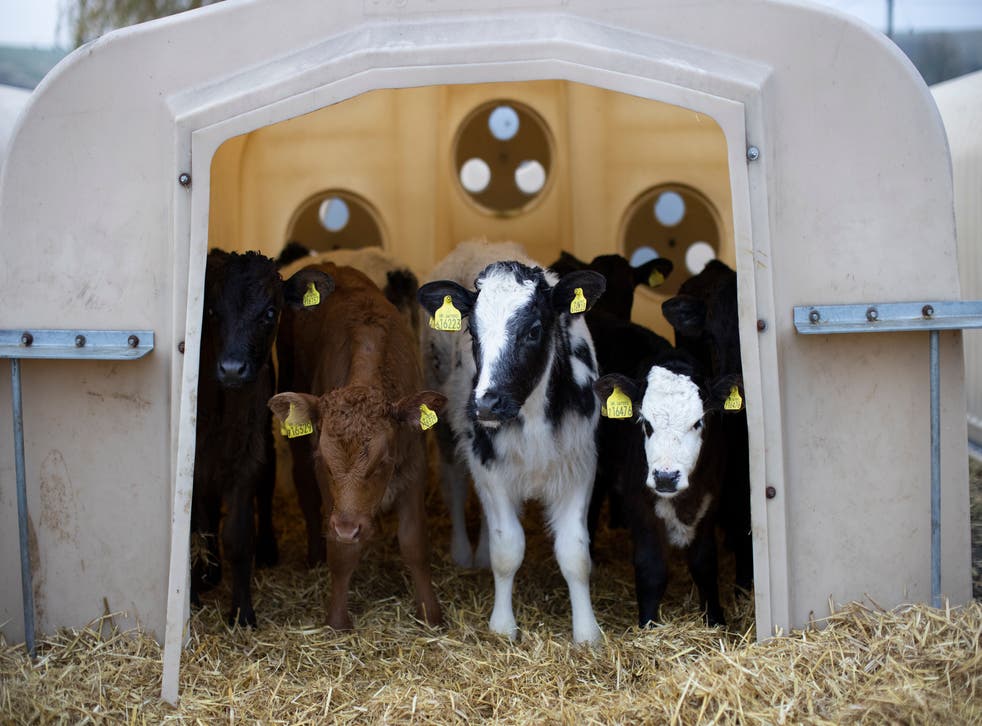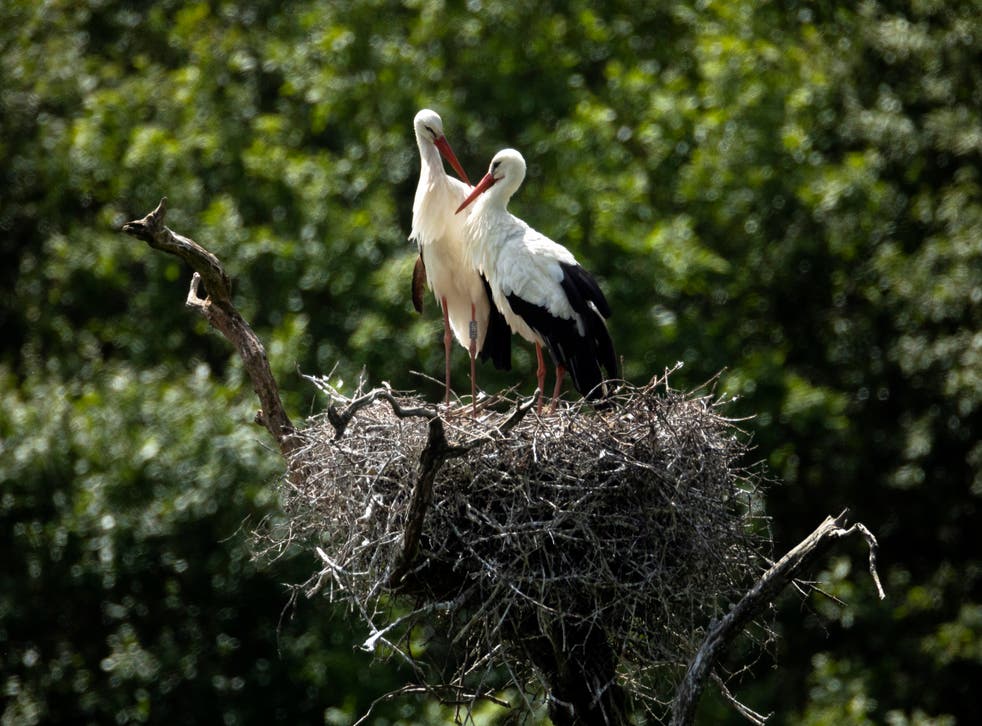Daisy Dunne explores a major scientific report on how governments and citizens can help halt the destruction of the planet
Thursday 10 June 2021

Animal agriculture emits 10 to 100 times more greenhouse gases per unit product than plant-based food, scientists say
(Getty Images)
Humans and livestock account for nearly 96 per cent of the mammals on the planet. That is just one of many staggering statistics included in a major report from more than 50 of the world’s leading climate and nature scientists.
The peer-reviewed analysis warns that global temperatures are already up by more than 1C since the start of industrialisation, while more species are at risk of extinction now than at any other time in human history.
The report, the first collaboration from the UN authorities on the climate crisis and biodiversity loss, argues that both issues must be tackled together to be successfully solved.
Within its list of 41 recommendations, the report points to a range of potential “win-win” solutions that offer promise for tackling both temperature rise and nature decline. Below, The Independent explores some of the options.
Recommended

World will fail unless climate and nature crises are tackled together, says major report
Plant-based diets
The world’s food system accounts for around a third of all greenhouse gas emissions, the report says. Farming is also a major driver of wildlife loss, with a recent study finding that 17,000 species are set to lose at least part of their habitat if agricultural expansion goes on uncurbed.
Animal agriculture – particularly beef production – is particularly polluting. The main reason for this is because cows and sheep are “ruminants” – meaning they belch out large amounts of the greenhouse gas methane when digesting food. In addition, livestock production requires large amounts of forested land to be cleared to create space for grazing cattle or to grow animal feed, which causes further greenhouse gas emissions to be released.
The report recommends that rich countries switch to plant-based diets, containing more fruit and vegetables and less meat and dairy, to help to tackle the climate crisis and biodiversity loss.
Recommended

Plant-based diets
The world’s food system accounts for around a third of all greenhouse gas emissions, the report says. Farming is also a major driver of wildlife loss, with a recent study finding that 17,000 species are set to lose at least part of their habitat if agricultural expansion goes on uncurbed.
Animal agriculture – particularly beef production – is particularly polluting. The main reason for this is because cows and sheep are “ruminants” – meaning they belch out large amounts of the greenhouse gas methane when digesting food. In addition, livestock production requires large amounts of forested land to be cleared to create space for grazing cattle or to grow animal feed, which causes further greenhouse gas emissions to be released.
The report recommends that rich countries switch to plant-based diets, containing more fruit and vegetables and less meat and dairy, to help to tackle the climate crisis and biodiversity loss.
Recommended

What your red meat habit is doing to the planet
“Our management of the land is not good for either the climate or biodiversity,” said Professor Pete Smith, report author and chair of plant and soil science at the University of Aberdeen.
“Animal agriculture not only emits 10 to 100 times more greenhouse gases per unit product than plant-based food, it also uses 10 to 100 times more land. So a shift toward more plant-based diets would reduce the pressure on land, meaning farming could be done in a more environmentally friendly way.”
The extent to which people should cut back on meat varies from country to country, he said. In the UK, meat eating must fall by 10 per cent by 2025 and 35 per cent by 2050 if the country is to meet its climate goals, according to its independent climate advisers.
Prof Smith added that switching to more sustainable agricultural practices, such as including trees in cropland and taking care to replenish soils, could also play a role in minimising the environmental impact of the food system.
Rewilding
One of the most important ways the world can tackle the climate and nature crises is by halting the destruction of carbon-rich and biodiverse ecosystems, the report says.
Around 77 per cent of the world’s land and 87 per cent of its oceans have been degraded by humans – putting more species at risk of extinction than at any other time in human history, according to the research.
The assault on natural spaces is also a major driver of the climate crisis, with the clearing of forests and other carbon-rich ecosystems causing long-held stores of CO2 to be released into the atmosphere.
But in addition to stopping the destruction of ecosystems, humans must go further by rewilding and restoring degraded land and ocean environments, the report authors say.
Rewilding damaged landscapes could help to remove CO2 from the atmosphere while providing more space for nature, said Prof Camille Parmesan, a report author and ecologist at Plymouth University
“Our management of the land is not good for either the climate or biodiversity,” said Professor Pete Smith, report author and chair of plant and soil science at the University of Aberdeen.
“Animal agriculture not only emits 10 to 100 times more greenhouse gases per unit product than plant-based food, it also uses 10 to 100 times more land. So a shift toward more plant-based diets would reduce the pressure on land, meaning farming could be done in a more environmentally friendly way.”
The extent to which people should cut back on meat varies from country to country, he said. In the UK, meat eating must fall by 10 per cent by 2025 and 35 per cent by 2050 if the country is to meet its climate goals, according to its independent climate advisers.
Prof Smith added that switching to more sustainable agricultural practices, such as including trees in cropland and taking care to replenish soils, could also play a role in minimising the environmental impact of the food system.
Rewilding
One of the most important ways the world can tackle the climate and nature crises is by halting the destruction of carbon-rich and biodiverse ecosystems, the report says.
Around 77 per cent of the world’s land and 87 per cent of its oceans have been degraded by humans – putting more species at risk of extinction than at any other time in human history, according to the research.
The assault on natural spaces is also a major driver of the climate crisis, with the clearing of forests and other carbon-rich ecosystems causing long-held stores of CO2 to be released into the atmosphere.
But in addition to stopping the destruction of ecosystems, humans must go further by rewilding and restoring degraded land and ocean environments, the report authors say.
Rewilding damaged landscapes could help to remove CO2 from the atmosphere while providing more space for nature, said Prof Camille Parmesan, a report author and ecologist at Plymouth University
.
White storks are one of several species benefiting from rewilding in England
(Getty Images)
“We cannot avoid dangerous climate change without sucking up some of the carbon we’ve already put into the atmosphere,” she said.
“At this point reducing emissions is essential, but not enough, and the best way to suck up carbon is to use the power of plants.”
In the UK, protecting and restoring the country’s carbon-rich peatlands could deliver a “win-win” for the climate and nature, said Prof Smith.
“The big-ticket option in the UK is peatlands, particularly in the north and west of the country where we have large areas of peatlands – over 80 per cent of which are in relatively poor condition, they’ve been drained for grazing or otherwise mismanaged,” he said.
“They emit huge amounts of carbon. A degraded peatland can be emitting over 30 tonnes of CO2 per hectare per year. To put that in context, an average family car emits about four tonnes of CO2 a year.”
“Switching off that big source of emissions is something that is really important and really good for biodiversity.”
Combining nature and technology
Pursuing solutions that combine natural techniques with new technologies could also offer promise for the climate and wildlife, the report says.
One way this could be achieved is by combining technologies to produce renewable electricity with natural ways of restoring the land, the scientists say in their report.
“The combination of nature-based and technology-based climate change solutions on land and at sea is in its infancy but may provide co-benefits for climate and biodiversity,” the report reads.
“For example, [cattle] grazing underneath solar panels can enhance soil carbon stocks, and grazing as well as cropping associated with solar farms could provide food.”
In addition, city planners should prioritise building “green infrastructure” that aims to tackle the climate crisis while providing space for nature in urban areas, the report adds.
“Urban greening, including the creation of urban parks, green roofs and urban gardens, reduces [heat], enhances urban biodiversity and improves quality of life including physical and mental well-being,” it says.
Comments
SU
SunnyUplands

White storks are one of several species benefiting from rewilding in England
(Getty Images)
“We cannot avoid dangerous climate change without sucking up some of the carbon we’ve already put into the atmosphere,” she said.
“At this point reducing emissions is essential, but not enough, and the best way to suck up carbon is to use the power of plants.”
In the UK, protecting and restoring the country’s carbon-rich peatlands could deliver a “win-win” for the climate and nature, said Prof Smith.
“The big-ticket option in the UK is peatlands, particularly in the north and west of the country where we have large areas of peatlands – over 80 per cent of which are in relatively poor condition, they’ve been drained for grazing or otherwise mismanaged,” he said.
“They emit huge amounts of carbon. A degraded peatland can be emitting over 30 tonnes of CO2 per hectare per year. To put that in context, an average family car emits about four tonnes of CO2 a year.”
“Switching off that big source of emissions is something that is really important and really good for biodiversity.”
Combining nature and technology
Pursuing solutions that combine natural techniques with new technologies could also offer promise for the climate and wildlife, the report says.
One way this could be achieved is by combining technologies to produce renewable electricity with natural ways of restoring the land, the scientists say in their report.
“The combination of nature-based and technology-based climate change solutions on land and at sea is in its infancy but may provide co-benefits for climate and biodiversity,” the report reads.
“For example, [cattle] grazing underneath solar panels can enhance soil carbon stocks, and grazing as well as cropping associated with solar farms could provide food.”
In addition, city planners should prioritise building “green infrastructure” that aims to tackle the climate crisis while providing space for nature in urban areas, the report adds.
“Urban greening, including the creation of urban parks, green roofs and urban gardens, reduces [heat], enhances urban biodiversity and improves quality of life including physical and mental well-being,” it says.
Comments
SU
SunnyUplands
13 days ago
It's a consciousness awkening and it's humanities only hope for a tolerable future. The animal slaves and the planet's ecosystems are suffering in a human created hell
My Name Is Private
It's a consciousness awkening and it's humanities only hope for a tolerable future. The animal slaves and the planet's ecosystems are suffering in a human created hell
My Name Is Private
13 days ago
The selfish bacon-munching, 4x4 driving, Tory-voting horde of philistines will not change their greedy lifestyles one iota to save the planet; they don't care about anything and anyone beyond their garden gate, the rest of us can go to hell and it just adds to news items for their amusement. Not until there is no NHS, their home floods or burns, no police come when they are robbed or burgled, they get red-meat-induced cancer will they give a damn...and then only about the impact on themselves. 'Tis pointless attempting to educate or persuade them; look at the ignorance of Johnson, Trump, Bolsanero et al for their modus operandi.
Feral capitalism and its mendacious self-obsessed children are going to be the death of everything. The best way to go forward is not to have any children...why inflict the coming suffering on a new generation?
The only way to win is not to play.
LE
LeeBlue
Feral capitalism and its mendacious self-obsessed children are going to be the death of everything. The best way to go forward is not to have any children...why inflict the coming suffering on a new generation?
The only way to win is not to play.
LE
LeeBlue
13 days ago
Sure ! All great ideas to better things !
But , a massive but !
Until the likes of Trump and Johnson ,( I use those two names as the epitomy of greedy capitalism, there are of course many more, and it runs very deep in all societies to the point of creating divisiveness in the extreme ) and the "system" that is continually in search of the "Holy Grail" of "Growth"!
Until this is extinguished,there is absolutely no hope for the human race or this planet, as we know it today !
How can it be expected of the lumpenproletariat, to change their habits of eating and regard for the Planet,in order to bring about change, when their so called leaders , and their entire "machinations", promote excessive wealth, excessive consumption, and as we have seen during this pandemic, excessive "wanting" of foreign travel, Pubs ,Restaurant's and Entertainment for the masses ,using all sorts of pollutantsi.e. mass travel,mass events,mass everything, to accomplish the need for profit !
The circle of greed must be broken from the top down . . . and lead by example !
Sure ! All great ideas to better things !
But , a massive but !
Until the likes of Trump and Johnson ,( I use those two names as the epitomy of greedy capitalism, there are of course many more, and it runs very deep in all societies to the point of creating divisiveness in the extreme ) and the "system" that is continually in search of the "Holy Grail" of "Growth"!
Until this is extinguished,there is absolutely no hope for the human race or this planet, as we know it today !
How can it be expected of the lumpenproletariat, to change their habits of eating and regard for the Planet,in order to bring about change, when their so called leaders , and their entire "machinations", promote excessive wealth, excessive consumption, and as we have seen during this pandemic, excessive "wanting" of foreign travel, Pubs ,Restaurant's and Entertainment for the masses ,using all sorts of pollutantsi.e. mass travel,mass events,mass everything, to accomplish the need for profit !
The circle of greed must be broken from the top down . . . and lead by example !
SEE
No comments:
Post a Comment